|
|
|
Sort Order |
|
|
|
Items / Page
|
|
|
|
|
|
|
| Srl | Item |
| 1 |
ID:
123356
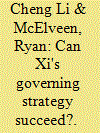

|
|
|
|
|
| Publication |
2013.
|
| Summary/Abstract |
[W]ithout gradual but bold reform of the legal system, media openness, and a more accountable and representative political structure, the next phase of economic reform will not go far.
|
|
|
|
|
|
|
|
|
|
|
|
|
|
|
|
| 2 |
ID:
130412
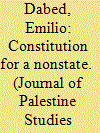

|
|
|
|
|
| Publication |
2014.
|
| Summary/Abstract |
This article sheds new light on the political history of legal-constitutional developments in Palestine in the fourteen years following the Oslo Accord. It examines the relationship between the unfolding social, political, and economic context in which they arose, on the one hand, and PA law-making and legal praxis, on the other. Focusing on the evolution of the Palestinian Basic Law and constitutional regime, the author argues that the "Palestinian constitutional process" was a major "battlefield" for the actors of the Palestinian-Israeli conflict. Thus, changes in the actors' political strategies at various junctures were mirrored in legal-constitutional forms, specifically in the political structure of the PA. In that sense, the constitutional order can be understood as a sort of "metaphoric representation" of Palestinian politics, reflecting, among other things, the colonial nature of the Palestinian context that the Oslo process only rearticulated. This perspective is also essential for understanding the evolution of the Palestinian-Israeli conflict after Oslo.
|
|
|
|
|
|
|
|
|
|
|
|
|
|
|
|
| 3 |
ID:
086386
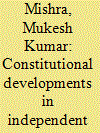

|
|
|
|
|
| Publication |
2008.
|
| Summary/Abstract |
The first constitution of the independent and sovereign Republic of Kazakhstan was adopted in January 1993. Amidst heated debate in the Supreme Soviet building and heckling by a crowd of protesters outside, the Kazakh Parliament retified the country's first post-Soviet constitution in January 1993.
|
|
|
|
|
|
|
|
|
|
|
|
|
|
|
|
| 4 |
ID:
097017


|
|
|
|
|
| Publication |
2010.
|
| Summary/Abstract |
This article presents an experiment in which 49 Indonesian villages were randomly assigned to choose development projects through either representative-based meetings or direct election-based plebiscites. Plebiscites resulted in dramatically higher satisfaction among villagers, increased knowledge about the project, greater perceived benefits, and higher reported willingness to contribute. Changing the political mechanism had much smaller effects on the actual projects selected, with some evidence that plebiscites resulted in projects chosen by women being located in poorer areas. The results suggest that direct participation in political decision making can substantially increase satisfaction and legitimacy.
|
|
|
|
|
|
|
|
|
|
|
|
|
|
|
|
| 5 |
ID:
130494
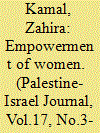

|
|
|
|
|
| Publication |
2011.
|
| Summary/Abstract |
The concept of women's empowerment is historically associated with national liberation movements throughout the world. the contributions of the American civil rights movement, and contributions of feminist movements in developing countries in Latin America and Asia. This concept focused on collective empowerment challenging the stereotypes about gender relations and was used, clearly and explicitly. in the l970s in order to launch the struggle for social justice and equality between women and men._ and facilitated through the establishment of economic, social and political structures. During the 1990s this concept lost its original transformational, and to a degree radical. concept, when it was linked to the ongoing transformations in the global economy and changes in the nature of the state and civil society. and to improvements at the level of development theories. Development discourse has focused on expanding women's options and levels of production as individuals, in most cases apart from the work programs of' women's -movements in the context of the state's withdrawal and abandoning of' its responsibilities in the spheres of economic and social support.'
|
|
|
|
|
|
|
|
|
|
|
|
|
|
|
|
| 6 |
ID:
131991


|
|
|
|
|
| Publication |
2014.
|
| Summary/Abstract |
This article has two main aims. First, it aims to challenge the widespread narrative in Cyprus studies that presents ethnic identities as historically inevitable and natural. Rather, identities need to be conceptualized as socially constructed. The second aim of this article is to problematize the argument that ethnic or national groups are homogenous actors. It underlines the need to deconstruct these supposedly unitary actors by making use of a class-based conceptualization of the state. By using such a conceptualization, the article will focus on the period between 1878 and 1974. It will start with a concrete analysis of the class structure in the Cypriot society and then will trace how different classes in both communities positioned themselves vis-à-vis political structures of power and how these positionings paved the way to the division of the island.
|
|
|
|
|
|
|
|
|
|
|
|
|
|
|
|
| 7 |
ID:
131460
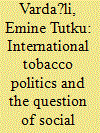

|
|
|
|
|
| Publication |
2014.
|
| Summary/Abstract |
A proliferation of scholarly works offering a variety of modernization experiences facilitated an understanding of social protests in non-western settings. Focusing on the initial stages of modern social movements in Iran and the Ottoman Empire, this study makes a comparative analysis of the tobacco protests at the turn of the twentieth century. The social protests against foreign tobacco monopolies are regarded as a key moment for the emergence of modern social movements in these countries. Scrutinizing the negotiation strategies, social value systems and political structures of these countries, it is suggested that these tobacco protests played a catalytic role in the process of capitalist incorporation and adaptation to the accompanying value systems of modernism and liberal democracy.
|
|
|
|
|
|
|
|
|
|
|
|
|
|
|
|
| 8 |
ID:
140301
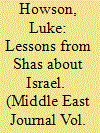

|
|
|
|
|
| Summary/Abstract |
This article focuses on the Israeli ethno-religious party Shas and its role in the Israeli social and political structure. It is argued that while Shas functions successfully in Israel’s Western-style political system, it does so as a more typical “Middle Eastern” party. Thus understanding the context within which Shas operates and its relation to political and societal divisions offers an insight into Israeli society and its political system.
|
|
|
|
|
|
|
|
|
|
|
|
|
|
|
|
| 9 |
ID:
130413
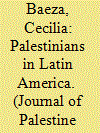

|
|
|
|
|
| Publication |
2014.
|
| Summary/Abstract |
Latin America is host to an estimated half-million people of Palestinian descent, the largest such population outside the Arab world. Migration to the region began in the late 1800s and peaked between 1900 and 1930, with surges around periods of war or economic crisis in Palestine. Predominantly the descendants of a pre-Nakba generation, mostly middle to upper-class Christians who are well-represented among political and business elites, Palestinians in Latin America do not easily fit into a national narrative shaped by the refugee experience. They have therefore held little interest for Palestinian historiography as they did not meet the criteria of "Palestinian-ness" as defined by a nationalist discourse centered on dispossession, denial, and statelessness. With a special focus on Chile,1 this article presents a historical overview of the Palestinian émigré community in Latin America, shedding light on its diverse and dynamic identity politics.
|
|
|
|
|
|
|
|
|
|
|
|
|
|
|
|
| 10 |
ID:
151699
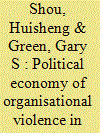

|
|
|
|
|
| Summary/Abstract |
“Organisational violence” involves wilful, illegal business behaviour that has the potential to harm workers, consumers, or the environment. We use a combined perspective from the fields of political economy and criminology to examine the incongruously high level of organisational violence among Chinese firms that exists despite robust efforts by the government to put forth regulatory laws that prohibit it. As the explanation for this incongruity, we assert two conditions that synergistically interact in a bidirectional relationship: 1) the complex legal structural barriers to effective enforcement against organisational violence caused by a politically biased and administratively fragmented Chinese political system, and 2) a socially disorganised business environment that does not recursively message the wrongfulness of organisational violence. The analysis rejects not only financial gain as a relevant factor in the commission of organisational violence but also other current perspectives on the causes of organisational violence in China.
|
|
|
|
|
|
|
|
|
|
|
|
|
|
|
|
| 11 |
ID:
091146
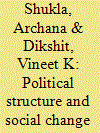

|
|
|
|
|
| Publication |
2009.
|
| Summary/Abstract |
The central and most distinguishing feature of the traditional Tibetan policy was the theocratic nature of the government. Another unique feature of the Tibetan government was its dualistic structure of administrate bosses were two in number- one monk and other, a lay official.
|
|
|
|
|
|
|
|
|
|
|
|
|
|
|
|
| 12 |
ID:
134031
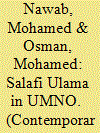

|
|
|
|
|
| Publication |
2014.
|
| Summary/Abstract |
The Salafi ulama (religious scholars) in Malaysia have seen their religious and political influence amplified over the last five years. Operating within a newly formed organization, the Pertubuhan Ilmuwan Malaysia (ILMU) and the newly augmented United Malays National Organization's (UMNO) young ulama wing, Salafi scholars play a key role in providing Islamic legitimacy to the government and defending it against the opposition Islamist party, the Pan-Malaysian Islamic Party (PAS). The decision by Salafi scholars to support the Malaysian government is striking given their hardline views on the implementation of Islamic laws and their opposition to democracy. This paper seeks to understand the reasons for the Salafi ulama's support for UMNO. It argues that the Salafi ulama's involvement in UMNO is due to a convergence of interest between the two groups and as part of a strategy by the Salafi ulama to expand their influence at both the state and societal levels. The paper examines the religious-political positions of the Salafi ulama on issues such as the Islamic state, the implementation of Islamic laws and democratic political system, and argues that they are opposed to the current state of religious affairs and the political structure of the Malaysian state. Nevertheless, the ulama are working within UMNO to change the political system. For UMNO leaders, the Salafi ulama form an important group that could defend the party against religious attacks from PAS and provide the party with greater religious credence.
|
|
|
|
|
|
|
|
|
|
|
|
|
|
|
|
| 13 |
ID:
139279
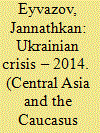

|
|
|
|
|
| Summary/Abstract |
The author analyzes the impact of the current Ukrainian crisis on the political structure of the post-Soviet region and national security of the Azerbaijan Republic. The events that have been unfolding in Ukraine since 2014 can be described as the acutest crisis in the relations between the Russian Federation and the West since the end of the Cold War, while the emerging situation is fraught with changes at the regional level and in the security context of all the post-Soviet states.
At the regional level, these changes have added to structural instability and, hence, transitivity. Azerbaijan, as a regional state, is facing greater structural risks accompanied by much fewer economic and political opportunities to implement its national security strategy.
|
|
|
|
|
|
|
|
|
|
|
|
|
|
|
|
| 14 |
ID:
132874
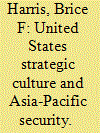

|
|
|
|
|
| Publication |
2014.
|
| Summary/Abstract |
This article adopts an historical socio-cultural lens to analyse the United States' strategic cultural tendencies. It traces the roots of the mutually constitutive relationship between technology and political structures in the United States to explain the dominant tendency of the United States to substitute technology for strategy in war as a predisposition of national strategic culture. This predisposition was seen particularly in network-centric warfare and effects-based operations. I conclude that the United States risks strategic failure due to the limitations of its ethnocentric security paradigm. Over-reliance on technology obscures strategic understanding of the people and cultures of the world, including those of the Asia-Pacific region. The development of the AirSea Battle is a case in point, a direct application of technology to strategic concerns in the Asia-Pacific region. The strategic pivot towards the Asia-Pacific may be characterized as reflecting more historical continuity than change in America's strategic calculus. The emerging Asia-Pacific security dynamic is no different a challenge for American policy-makers in that regard than challenges presented elsewhere in the world. Perhaps the biggest challenge for American leaders is to overcome institutional intransigence or the lure of ideological conformity when addressing military requirements and budgetary commitments.
|
|
|
|
|
|
|
|
|
|
|
|
|
|
|
|
| 15 |
ID:
140777


|
|
|
|
|
| Publication |
Cambridge, Schenkman Publishing company, 1969.
|
| Description |
viii, 213p.pbk
|
|
|
|
|
|
|
|
|
|
|
|
Copies: C:1/I:0,R:0,Q:0
Circulation
| Accession# | Call# | Current Location | Status | Policy | Location |
| 008659 | 959.704/ISA 008659 | Main | On Shelf | General | |
|
|
|
|
| 16 |
ID:
131643
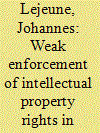

|
|
|
|
|
| Publication |
2014.
|
| Summary/Abstract |
The discrepancy between de jure and de facto protection of intellectual property rights in China remains a heatedly debated topic. Unfortunately, political motivations have distorted the debate from its very beginning, which has not only resulted in a tendency for the different explanations to be played off against each other, but has also reinforced their specific flaws and biases. This study addresses these problems by advancing and integrating the three main explanatory frameworks for explaining the situation. The resulting integrated framework finds that structural factors such as bureaucratic fragmentation and political decentralization matter most in practical terms, but their durability cannot be understood without putting them into context. The findings also suggest that, contrary to most predictions, the future development of intellectual property protection in China might not follow the path laid down by other countries that have modernized in the past.
|
|
|
|
|
|
|
|
|
|
|
|
|
|
|
|
|
|
|
|
|